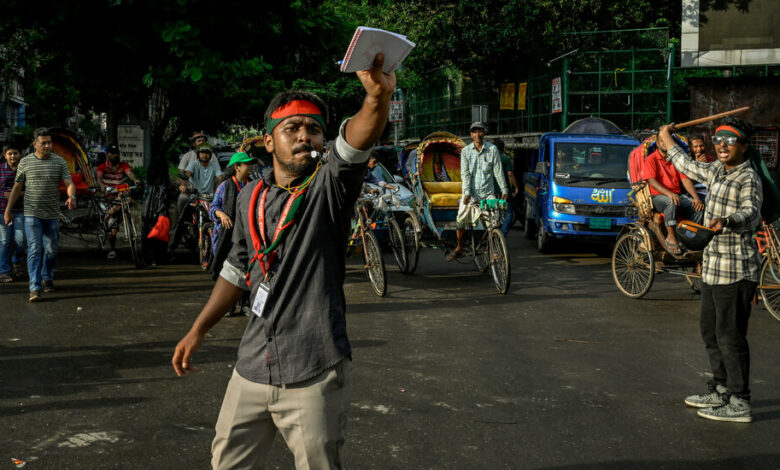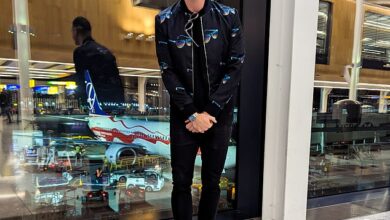Where 16-year-olds run the streets: Bangladesh in limbo

The two black VIP vehicles, with the Bangladeshi national flag displayed on their hoods as per state protocol, were parked late last night in a parking lot on the ground floor of Dhaka University.
The cars were waiting for two students, both 26. Just a week earlier, they had been hunted down by leaders of a youth-led popular uprising against the country’s seemingly unbreakable prime minister. Now, after her astonishing ouster, the two are ministers in the country’s interim government.
In the parking lot, young women and men gathered around this most unlikely of government officials, asking questions and posing for selfies. Graffiti sprayed on a pillar at the entrance read: “Revolution is not a dinner party.”
Outside, the streets of this country of 170 million people are run by students.
After overcoming a deadly crackdown and ousting Bangladesh’s iron-fisted ruler Sheikh Hasina, the student protesters are now trying to chart a new course for a country that was born in a bloody rift five decades ago and has been marred by political violence ever since.
The magnitude of their task is not lost on anyone. Not even the young leaders and mobilizers themselves, who are surprised by what they have achieved and rush to protect the spaces that have fallen into their hands.
Ms Hasina’s power had become so all-encompassing that her departure precipitated a near-total collapse of the state. A wave of violence, including revenge killings and arson, continued after her departure, with the country’s long-persecuted Hindu minority in particular living in fear. Nearly all of the country’s police officers went into hiding, fearing reprisals for their role in the killing of hundreds of young protesters.
Students direct traffic in Dhaka, the busy capital — checking driver’s licenses and reminding people to wear helmets. At some roundabouts, the punishments they dish out to violators are straight out of the classroom: an hour of waiting for a wrong turn, 30 minutes for not wearing a seat belt.
A female student, who looked no older than 16, tried to direct traffic on a busy street with the zeal of an overachiever, shouting more pleas than commands at each “bhaiya,” Bengali for brother.
“Bhaiya — helmet!” she begged a man speeding past on his motorbike. “Bhaiya — footpath, footpath!” she shouted at a group of pedestrians.
A car full of New York Times journalists was stopped by a boy who looked no older than 12. He asked to see a driver’s license.
In another corner of the city where the worst of the violence had taken place, Salman Khan, 17, and two other students manned a roundabout, occasionally pulling over the most luxurious cars. What exactly were they looking for?
“Black money, black money,” Mr Khan said, explaining that many of Ms Hasina’s senior officials were on the run.
Outside her sprawling official residence, which was stormed and ransacked by protesters last week as she fled to India, a teenage student sat on a chair and talked incessantly on the phone.
This was her station. When an army soldier asked her for something, she extended her free hand in a gesture meant to silence him — a single gesture that summed up everything that has suddenly changed in Bangladesh.
The students who now govern this country are led by a very different figure: the 84-year-old Nobel Peace Prize winner Muhammad Yunus. He is using his legendary legacy as a helper of the poor to become the interim leader of a country in disarray. But he has accepted the mantle of a hand-picked grandfather figure for what the students describe as “generational transformation.”
“I am doing this because this is what the youth of the country wanted, and I wanted to help them achieve this,” Mr. Yunus said in a briefing with reporters over the weekend. “It is not my dream, it is their dream.”
Nahid Islam, a key leader of the student protest who said he was blindfolded and tortured by security forces, described the immense pressure now placed on the movement, “even though we were not prepared for it.”
“The day Hasina stepped down, we realised that everyone wanted to hear from us — what is the next step for Bangladesh? How will Bangladesh be governed? How will the government be formed?” he said in an interview at the parking lot of Dhaka University.
Mr. Islam and a second leader, Asif Mahmud, are two of the 17 ministers in the cabinet. Mr. Mahmud oversees the Ministry of Youth and Sports. Mr. Islam’s portfolio in particular has a tinge of justice — he is in charge of the Ministry of Information Technology, after Ms. Hasina shut down the internet to crush the movement.
“It’s a coincidence,” Mr. Islam said, smiling.
Behind the scenes, other student leaders are trying to figure out how to realize their idealistic vision for the future, even in these times of chaotic uncertainty.
Mahfuj Alam, 26, one of the leaders tasked with gathering input for a roadmap, said the country needed a new political settlement based on three principles: dignity, compassion and responsibility.
“We want coordinated change, complex change that will enable future governments to be democratic and accountable,” Mr Alam said.
The student leaders said the country must break its cycle of violence and the way it has been governed for most of its history. Power has been torn between two dynastic political parties that have alternated between perpetrators and victims of the country’s brutal policies. The students are equally wary of a third force, the Jamaat-e-Islami party, the Islamist movement that Ms. Hasina has banned as a radical.
The students want to distance themselves from the contradictions – the two dynastic parties, but also from the ‘militant Islamism’ and ‘militant secularism’ between which the country has been caught in recent years.
“This generation really, really wants real change,” Mr. Alam said, “not just talk or chatter about a few families, about a few histories, about a few glories.”
But before the Bangladesh of tomorrow can become a reality, security must be restored today.
The country finds itself in a strange reality: the military, with its own history of abuses, has been deployed to police the police. Dozens of police officers have been killed in retaliation for Ms Hasina’s crackdown on protesters, and many fear returning to their jobs.
On the desk of an army officer standing outside a police station lay a pile of unclaimed badges from police officers who had fled. He sat among the carcasses of burned vehicles; the station behind him was a charred ruin.
A man in his 60s approached with dried blood and cuts on his face. He wanted to file a complaint against workers from the Bangladesh Nationalist Party, the main opposition to Ms Hasina, and said they had attacked him on his way to work at the court. The officer, Masud Rana, said that “this police station is not operational” and there was little he could do. Eventually he reassured the man by writing his name in a ledger.
“Our most important job is to ensure the safety of the police,” the officer said.
Later, a woman came with a request that the military absolutely could not help with. A police officer, she said, had taken about $400 in bribes to get her son released in a drug case. Could someone pay her back the money?
The interim government is scrambling to find creative ways to get police officers back to work and reduce the toxicity that comes with it. There have been leadership changes and talk of new uniforms. As a first step toward returning to a uniform presence, young cadets and scouts have been placed in roundabouts.
In one of them stood Tahia, an 18-year-old cadet, directing traffic with half a dozen other young women. A man waited quietly on the sidewalk nearby, occasionally pulling out a bottle of water to give to Tahia. It was her father.
When asked what he did for a living, the man grinned nervously and dodged the question. A few minutes later, he whispered in a reporter’s ear, “Her parents are both police officers.”
The interim government faces a huge task, not only in restoring law and order but also in reopening the economy. And its members understand that they may have little time. The interim government can only survive as long as it shows that it can deliver something different.
The interim leaders will soon face a battle between the established political parties and their corporate financiers, who want quick elections.
A direct test could come on Thursday, when Ms Hasina’s Awami League party has called for a march, bringing the party — with a sparse law enforcement presence — face to face with the movement that toppled it after 15 years in power.
But the interim leaders hope a trump card will buy them time. By toppling Ms. Hasina, they showed they had a broad mobilizing power that organized parties lacked. Those parties, they say, have been discredited by the kind of politics that ignored the aspirations of the young nation.
“If we go home now, there will be no change,” said Mr. Alam, one of the student leaders. “We don’t want to let them relax.”




